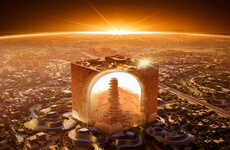A couple of weeks ago Pearl posted about an upside down house built by a German businessman as a tourist attraction in Trassenheide, a German town on the Baltic Sea island of Usedom.
As it turns out, that isn't the only place where people are building upside down.
As the photos show, there is upside down buildings in Poland, South Korea, Japan and Palma Nova has one called Katmandu.
There is an upside down White House in Pigeon Forge, Tennessee, and Vancouver even has an upside down church!
Upside-Down Architecture
6 Buildings on Their Heads
Trend Themes
1. Upside-down Architecture - Upside-down buildings as a unique and attention-grabbing architectural trend.
2. Tourist Attractions - Upside-down structures can be leveraged as intriguing and Instagrammable destinations for tourists.
3. Architectural Creativity - Upside-down construction presents an opportunity for architects to showcase their innovative and unconventional design skills.
Industry Implications
1. Tourism - Upside-down buildings can attract tourists and contribute to the growth of the tourism industry in various locations.
2. Architecture - Upside-down architecture provides architects with a platform to explore unique and boundary-pushing architectural concepts.
3. Entertainment - Upside-down structures can be utilized as interactive and immersive entertainment experiences, appealing to a wide range of audiences.






